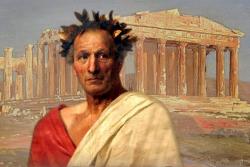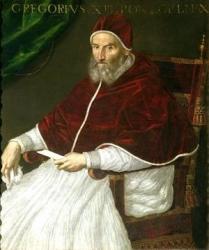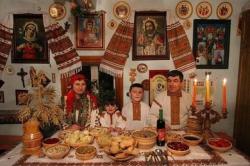When is Orthodox Christmas?
 For most people around the world, the Christmas celebrations are over, but for some Christians, they have just begun. For millions of Orthodox Christians, particulary in Central and Eastern Europe, Christmas is actually celebrated on the 6th and 7th January. Orthodox Christian celebrations begin with the sighting of the first star on Christmas Eve, 6th January, and continue through to Christmas Day. The reason for the difference in dates is down to the calendars used to calculate the dates. Julius Caesar introduced a calendar in 45 BC based on the advice of Sosigene, an Egyptian astronomer, who had calculated the lunar year. However, his measurements were wrong by approximately 11 minutes, and over the centuries the dates of major Christian holidays had drifted so much that it became an issue.
For most people around the world, the Christmas celebrations are over, but for some Christians, they have just begun. For millions of Orthodox Christians, particulary in Central and Eastern Europe, Christmas is actually celebrated on the 6th and 7th January. Orthodox Christian celebrations begin with the sighting of the first star on Christmas Eve, 6th January, and continue through to Christmas Day. The reason for the difference in dates is down to the calendars used to calculate the dates. Julius Caesar introduced a calendar in 45 BC based on the advice of Sosigene, an Egyptian astronomer, who had calculated the lunar year. However, his measurements were wrong by approximately 11 minutes, and over the centuries the dates of major Christian holidays had drifted so much that it became an issue.
 To rectify the Julian calendar, Pope Gregory XIII introduced the Gregorian calendar in 1582, which is the one we still use today, however, this presently means there is a 13-day difference between the two calendars. Spain, Portugal, France, Poland, Lithuania, Luxembourg, Italy and the Catholic Low Countries were the first nations to adopt this new Gregorian calendar upon its introduction. Other countries gradually converted to the new calendar over the centuries, Britain and the British Empire in 1752, Japan in 1873, China in 1912 and Saudi Arabia in 2016. In May 1923, a group of Orthodox church leaders met to address the issue. States including Greece, Cyprus and Rumania agreed to move to the new Gregorian calendar, but other Othodox churches, including Russia (home to more than a third of the world's Christians) Ukraine and Egypt, refused to change. Since 1923, Orthodox countries like Greece and Cyprus now celebrate their Christmas Day on 25th December, however, they still hold celebrations on Epiphany, 6th January, and Christmas Eve according to the Julian calendar.
To rectify the Julian calendar, Pope Gregory XIII introduced the Gregorian calendar in 1582, which is the one we still use today, however, this presently means there is a 13-day difference between the two calendars. Spain, Portugal, France, Poland, Lithuania, Luxembourg, Italy and the Catholic Low Countries were the first nations to adopt this new Gregorian calendar upon its introduction. Other countries gradually converted to the new calendar over the centuries, Britain and the British Empire in 1752, Japan in 1873, China in 1912 and Saudi Arabia in 2016. In May 1923, a group of Orthodox church leaders met to address the issue. States including Greece, Cyprus and Rumania agreed to move to the new Gregorian calendar, but other Othodox churches, including Russia (home to more than a third of the world's Christians) Ukraine and Egypt, refused to change. Since 1923, Orthodox countries like Greece and Cyprus now celebrate their Christmas Day on 25th December, however, they still hold celebrations on Epiphany, 6th January, and Christmas Eve according to the Julian calendar.
 The Greek Orthodox monks at the Mount Athos monasteries in Northern Greece continue to celebrate Christmas, New Year, Epiphany and Easter according to the old Julian calendar. Countries that celebrate Christmas Day on 7th January include: Russia, Belarus, Georgia, Egypt, Israel, Bulgaria, Serbia, Montenegro, North Macedonia, Moldova, Kazakhstan, Ethiopia and Eritrea. Ukraine finally changed its Christmas Day to 25th December in 2022.
The Greek Orthodox monks at the Mount Athos monasteries in Northern Greece continue to celebrate Christmas, New Year, Epiphany and Easter according to the old Julian calendar. Countries that celebrate Christmas Day on 7th January include: Russia, Belarus, Georgia, Egypt, Israel, Bulgaria, Serbia, Montenegro, North Macedonia, Moldova, Kazakhstan, Ethiopia and Eritrea. Ukraine finally changed its Christmas Day to 25th December in 2022.
 Some Orthodox Christians fast before Christmas Day on 7th January, usually excluding meat and dairy products. Even on Christmas Eve, most foods include Lenten bread, honey, nuts, poppyseed and dried fruits, beetroot and mushroom soups, potatoe and sauerkraut 'dumplings', cabbage rolls with buckwheat or rice, kidney beans with potatoes and garlic, pickled herrings and baked cod. Christmas Day becomes a day for feasting and enjoying the company of friends and family members, with meals including all kinds of meats and different types of pastries. The types of food and activities may vary depending on the country's culture and traditions. Little importance is given to the exchange of gifts and the commercialised Christmas, it's time to celebrate together with Christmas carols and friends.
Some Orthodox Christians fast before Christmas Day on 7th January, usually excluding meat and dairy products. Even on Christmas Eve, most foods include Lenten bread, honey, nuts, poppyseed and dried fruits, beetroot and mushroom soups, potatoe and sauerkraut 'dumplings', cabbage rolls with buckwheat or rice, kidney beans with potatoes and garlic, pickled herrings and baked cod. Christmas Day becomes a day for feasting and enjoying the company of friends and family members, with meals including all kinds of meats and different types of pastries. The types of food and activities may vary depending on the country's culture and traditions. Little importance is given to the exchange of gifts and the commercialised Christmas, it's time to celebrate together with Christmas carols and friends.